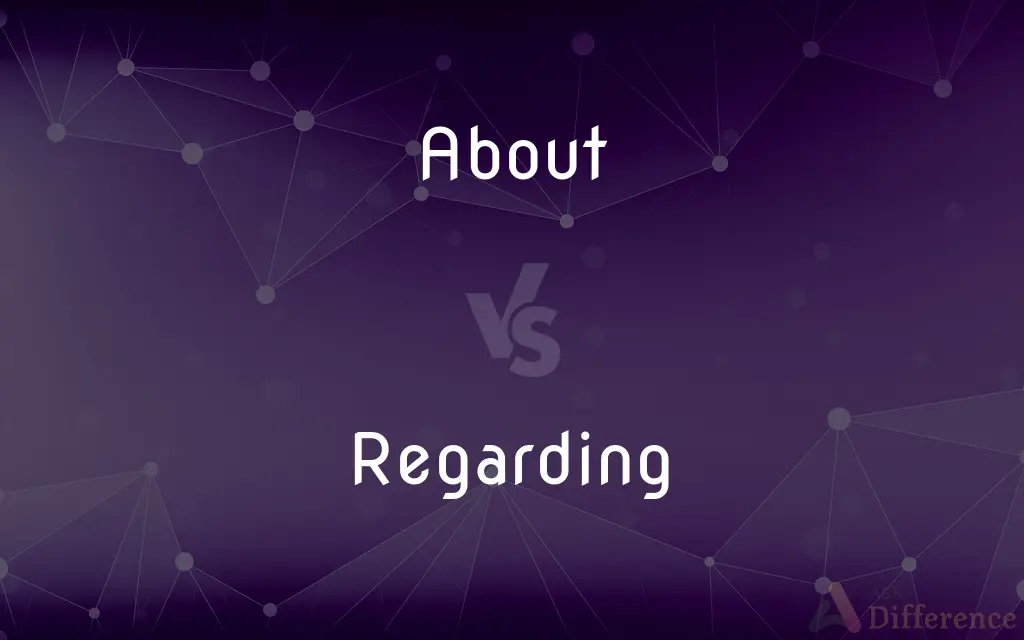About vs. Regarding — What's the Difference?
By Urooj Arif & Maham Liaqat — Updated on March 30, 2024
"About" implies a general topic or subject, often used to introduce broad discussions, while "Regarding" specifically directs attention to a particular issue or detail.

Difference Between About and Regarding
Table of Contents
ADVERTISEMENT
Key Differences
"About" is commonly used in both informal and formal contexts to indicate the subject or topic of a conversation or document. It sets the stage for a wide range of discussions, suggesting a general theme rather than pinpointing specifics. Whereas "Regarding" is more formal and precise, often used in professional or academic communications to focus the conversation on a specific aspect or detail of the broader topic.
When someone uses "about," it can introduce a broad subject area, allowing for a more exploratory discussion that might touch on various aspects related to the topic. On the other hand, "Regarding" serves to narrow down the conversation, signaling that what follows is directly relevant to a particular point of interest within the topic.
In writing, "about" is versatile, fitting smoothly into many types of sentences without sounding overly formal or stiff. It is used to give readers a general idea of the subject matter without restricting the scope too narrowly. Conversely, "Regarding" is particularly useful in business emails, academic papers, and formal reports, where clarity about the subject matter is paramount, and the intention is to draw attention to a specific issue or concern.
The choice between "about" and "regarding" can also reflect the speaker's or writer's intention in terms of tone and formality. "About" often introduces a more casual or broad-scoped inquiry, while "Regarding" is a choice that lends an air of formality and specificity, useful in contexts where precision is valued over breadth.
In spoken language, "about" is far more prevalent in everyday conversation, reflecting its flexibility and general applicability to a wide range of topics. In contrast, "Regarding" might be reserved for more structured or formal exchanges, where the speakers aim to clearly delineate the subject of their discussion from other potential conversational threads.
ADVERTISEMENT
Comparison Chart
Formality
Less formal, more versatile
More formal and precise
Usage Context
Broad discussions, general topic
Specific issues or details within a topic
Tone
Can be casual or formal
Generally formal
Prevalence
Common in spoken language
Preferred in written communications, especially professional or academic contexts
Scope
Introduces a wide subject area
Narrows down the conversation to specific aspects
Compare with Definitions
About
On the verge of; almost.
The ceremony is about to begin.
Regarding
Pertaining to; about.
She made several comments regarding the new policy.
About
Pertaining to; concerning.
The book about ancient Greece covers many topics.
Regarding
Directed toward; in regard to.
Our concerns regarding safety are being addressed.
About
Approximately; near in number, time, degree, etc..
There were about 50 guests at the party.
Regarding
In consideration of; considering.
Regarding your request, we need more time to decide.
About
Around; in the vicinity.
Look about the room for your missing shoe.
Regarding
With respect to; about.
His inquiry regarding your health was sincere.
About
Engaged in (activity).
They were about their work quietly.
Regarding
Concerning; in relation to.
The report regarding the market trends was insightful.
About
On the subject of; concerning
It's all about having fun
I was thinking about you
A book about ancient Greece
Regarding
In reference to; with respect to; concerning. See Usage Note at regard.
About
Used to indicate movement within a particular area
She looked about the room
Regarding
Present participle of regard
About
Used to express location in a particular place
Rugs were strewn about the hall
He produced a knife from somewhere about his person
Regarding
Concerning, respecting.
About
Used to indicate movement within an area
Men were floundering about
Finding my way about
Regarding
The act by which something is regarded or observed.
About
Used to express location in a particular place
There was a lot of flu about
Regarding
Concerning; respecting.
About
(used with a number or quantity) approximately
He's about 35
Reduced by about 5 per cent
About
Approximately; nearly
The interview lasted about an hour.
About
Almost
The job is about done.
About
To a reversed position or direction
Turn about and walk away slowly.
About
In no particular direction
Wandering about with no place to go.
About
All around; on every side
Let's look about for help.
About
In the area or vicinity; near
Spoke to a few spectators standing about.
About
In succession; one after another
Turn about is fair play.
About
On the verge of doing something; presently going to do something. Used with the infinitive
The chorus is about to sing.
About
Usage Problem Used to show determination or intention in negative constructions with an infinitive
I am not about to concede the point.
About
On all sides of; surrounding
I found an English garden all about me.
About
In the vicinity of; around
Explored the rivers and streams about the estate.
About
Almost the same as; close to; near.
About
In reference to; relating to; concerned with
A book about snakes.
About
In the act or process of
While you're about it, please clean your room.
About
In the possession or innate character of
Keep your wits about you.
About
Moving here and there; astir
The patient is up and about.
About
Being in evidence or existence
Rumors are about concerning his resignation.
About
In a circle around; all round; on every side of; on the outside of.
The snake was coiled about his ankle.
About
Over or upon different parts of; through or over in various directions; here and there in; to and fro in; throughout.
Rubbish was strewn about the place.
The children were running about the room.
He was well known about town.
About
Indicates that something will happen very soon; indicates a plan or intention to do something.
About
(with 'to' and verb infinitive) See about to.
About
On the point or verge of.
About
Concerning; with regard to; on account of; on the subject of; to affect.
He talked a lot about his childhood.
We must do something about this problem.
About
Concerned with; engaged in; intent on.
To be about one's business
About
Within or in the immediate neighborhood of; in contiguity or proximity to; near, as to place.
I can't find my reading glasses, but they must be somewhere about the house.
John's in the garden, probably somewhere about the woodshed.
About
On one's person; nearby the person.
I had no weapon about me but a stick.
About
(figurative) In or near, as in mental faculties or (literally) in the possession of; under the control of; at one's command; in one's makeup.
He has his wits about him.
There was an air of confidence about the woman.
About
On all sides; around.
I looked about at the scenery that surrounded me.
About
Here and there; around; in one place and another; up and down.
Bits of old machinery were lying about.
About
From one place or position to another in succession; indicating repeated movement or activity.
Walking about;
Rushing about;
Jumping about;
Thrashing about
About
Indicating unproductive or unstructured activity.
Messing about;
Fooling about;
Loafing about
About
Nearly; approximately; with close correspondence in quality, manner, degree, quantity, or time; almost.
It's about as cold as it was last winter.
He owes me about three hundred dollars.
Dinner's about ready.
I was so scared, I about fainted.
About
Near; in the vicinity.
About
To a reversed order; half round; facing in the opposite direction; from a contrary point of view.
To face about;
To turn oneself about
About
(nautical) To the opposite tack: see go about.
We went about and headed offshore.
About
In succession; one after another; in the course of events.
About
(archaic) In circuit; circularly; by a circuitous way; around the outside; in circumference.
A mile about, and a third of a mile across
About
Moving around; astir.
Out and about;
Up and about
After my bout with Guillan-Barre Syndrome, it took me 6 months to be up and about again.
About
In existence; being in evidence; apparent.
This idea has been about for a while but has only recently become fashionable.
About
Near; in the vicinity or neighbourhood.
I had my keys just a minute ago, so they must be about somewhere.
Watch out, there's a thief about.
About
Around; all round; on every side of.
About
In the immediate neighborhood of; in contiguity or proximity to; near, as to place; by or on (one's person).
About
Over or upon different parts of; through or over in various directions; here and there in; to and fro in; throughout.
Lampoons . . . were handed about the coffeehouses.
Roving still about the world.
About
Near; not far from; - determining approximately time, size, quantity.
He went out about the third hour.
About
In concern with; engaged in; intent on.
I must be about my Father's business.
About
On the point or verge of; going; in act of.
Paul was now aboutto open his mouth.
About
Concerning; with regard to; on account of; touching.
She must have her way about Sarah.
About
On all sides; around.
'Tis time to look about.
About
In circuit; circularly; by a circuitous way; around the outside; as, a mile about, and a third of a mile across.
About
Here and there; around; in one place and another.
Wandering about from house to house.
About
Nearly; approximately; with close correspondence, in quality, manner, degree, etc.; as, about as cold; about as high; - also of quantity, number, time.
About
To a reserved position; half round; in the opposite direction; on the opposite tack; as, to face about; to turn one's self about.
About
On the move;
Up and about
The whole town was astir over the incident
About
(of quantities) imprecise but fairly close to correct;
Lasted approximately an hour
In just about a minute
He's about 30 years old
I've had about all I can stand
We meet about once a month
Some forty people came
Weighs around a hundred pounds
Roughly $3,000
Holds 3 gallons, more or less
20 or so people were at the party
About
All around or on all sides;
Dirty clothes lying around (or about)
Let's look about for help
There were trees growing all around
She looked around her
About
In the area or vicinity;
A few spectators standing about
Hanging around
Waited around for the next flight
About
To or among many different places or in no particular direction;
Wandering about with no place to go
People were rushing about
News gets around (or about)
Traveled around in Asia
He needs advice from someone who's been around
She sleeps around
About
In or to a reversed position or direction;
About face
Brought the ship about
Suddenly she turned around
About
In rotation or succession;
Turn about is fair play
About
(of actions or states) slightly short of or not quite accomplished; `near' is sometimes used informally for `nearly' and `most' is sometimes used informally for `almost';
The job is (just) about done
The baby was almost asleep when the alarm sounded
We're almost finished
The car all but ran her down
He nearly fainted
Talked for nigh onto 2 hours
The recording is well-nigh perfect
Virtually all the parties signed the contract
I was near exhausted by the run
Most everyone agrees
Common Curiosities
Can "about" and "regarding" be used interchangeably?
While they can sometimes be used interchangeably, "regarding" is more formal and specific than "about," which is broader and more versatile.
Is "regarding" more formal than "about"?
Yes, "regarding" is generally considered more formal and is used to specifically focus on a particular issue or detail.
How do I choose between "about" and "regarding"?
Consider the context, the level of specificity you need, and the formality of the situation. "About" is more general and versatile, while "regarding" is specific and formal.
Is "regarding" suitable for casual conversations?
"Regarding" can be used in casual conversations, but it may come across as overly formal in some contexts.
Are there contexts where "regarding" is not appropriate?
"Regarding" might be too formal for casual, everyday conversations.
What role does "regarding" play in academic writing?
In academic writing, "regarding" helps to precisely identify the specific issue or aspect being discussed.
Can I use "about" in formal writing?
Yes, "about" can be used in formal writing, but its use depends on the context and the desired tone.
Can "about" start a sentence?
Yes, "about" can start a sentence when introducing a topic or subject.
Does "regarding" have synonyms?
Yes, synonyms include "concerning," "in relation to," and "with respect to."
How does "about" affect the tone of a sentence?
"About" can make a sentence sound less formal and more open-ended or general.
Is it better to use "regarding" in business communications?
"Regarding" is often preferred in business communications for its specificity and formal tone.
Does "regarding" only pertain to formal documents?
While commonly used in formal documents, "regarding" can also be used in any context where precision is needed.
Can "about" imply approximation?
Yes, "about" can indicate approximation in numbers, time, or measure.
Can the choice between "about" and "regarding" affect clarity?
Yes, using "regarding" can enhance clarity by focusing on specific details, whereas "about" is more general.
How does the use of "about" or "regarding" change a conversation?
"About" can broaden a conversation, while "regarding" narrows it down to specific points.
Share Your Discovery

Previous Comparison
Reagent vs. Solvent
Next Comparison
Appeal vs. RequestAuthor Spotlight
Written by
Urooj ArifUrooj is a skilled content writer at Ask Difference, known for her exceptional ability to simplify complex topics into engaging and informative content. With a passion for research and a flair for clear, concise writing, she consistently delivers articles that resonate with our diverse audience.
Co-written by
Maham Liaqat














































